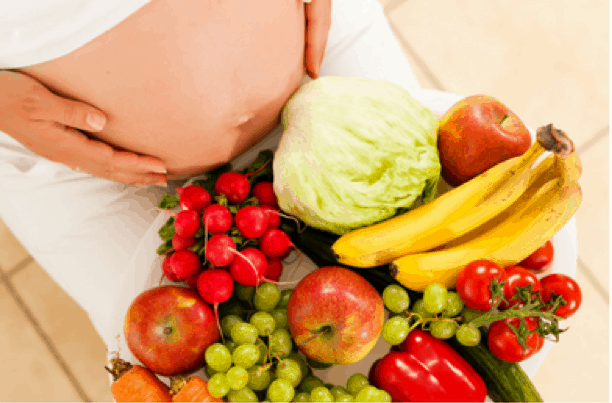

Pregnancy: Getting The Right Nutrition
We often see women in early stages pregnancy, sometimes when they have just discovered they are pregnant and whilst it’s a very exciting time, there is a lot of information to absorb about your body and your growing baby. Good nutrition is vital throughout pregnancy, especially early pregnancy when the baby is developing fastest. See below for our guide to early pregnancy nutrition from our Nutritional Therapist, Laura Southern.
Vitamin A
Important for baby’s lungs, maintenance of normal skin and vision
The main food sources of vitamin A are the “orange veg” and fruit with orange flesh (sweet potato, carrot, squash, pumpkin, cantaloupe melon, apricots, peaches and mango), peppers (red and yellow), dark green leaves (kale and mustard greens), oily and white fish (salmon, sardines and cod) and eggs, especially the yolk (free range, organic and thoroughly cooked).
You should aim to eat the vegetable sources one to two times daily and the animal sources twice to four times a week.
Folate/ Folic acid *
Important for all rapidly dividing cells. Helps to prevent neural tube defects, defects of spinal cord and brain.
The main food sources of folic acid are legumes (beans, lentils and chickpeas), green veg (asparagus, spinach, broccoli, green peas, Brussels sprouts, pak choi and parsley), other veg (cauliflower, corn and mushrooms) and fruit (citrus, blackberries, coconut, figs and dates). Food sources of folic acid should be eaten one to three times daily.
Iron
Important for: blood production (for both you and baby)
The main food sources of iron are red meat (pref organic, grass fed beef and lamb), seaweeds (kelp), legumes (soy beans, lentils and kidney beans), whole grains (wholemeal bread), seeds (sunflower seeds and sesame seeds), dark leafy greens (spinach, rocket and watercress), olives (black) and dried fruit (figs and dates).
Vegetable sources of iron should be eaten one to three times daily and animal sources one to three times weekly. Iron rich foods should be eaten with vitamin C to increase absorption, tea can block iron absorption, so avoid drinking near mealtimes.
Zinc
Important for cell, brain and sexual development.
The main food sources of zinc are meat (grass fed, organic beef, lamb, turkey and chicken), shell fish (well cooked shrimp), oily fish (sardines, mackerel and salmon), mushrooms (white, morel and portobello), seeds (pumpkin seeds), nuts (cashews) and legumes (quinoa). Vegetable sources of zinc should be eaten one to three times daily and animal sources one to three times weekly.
Calcium
Important for bones, teeth and muscles.
The main food sources of calcium are seeds (sesame and chia seeds), fish bones (tinned sardines and tinned salmon), dairy (yoghurt and hard cheese), dried fruit (figs and dates), alliums (garlic and onion), legumes (tofu and quinoa) and dark green veg (kale and broccoli). Vegetable sources of calcium should be eaten one to three times daily and animal sources one to four times weekly.
Essential Fatty Acids (omega 3 and 6)
Important for brain and nerve development and cell health.
The main food sources of omega 3 and 6 are oily fish (salmon, mackerel, sardines, herring and anchovies), raw nuts (walnuts and almonds) and seeds (flax and chia). Vegetable sources of omega 3 and 6 should be eaten one to two times daily and animal sources three times weekly (maximum).
We recognise the importance of good nutrition in pregnancy and offer all our early pregnancy patients a nutritional consultation. To view our early pregnancy packages click here.



